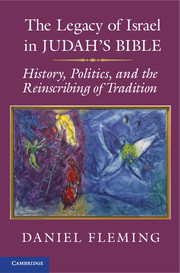Book contents
- Frontmatter
- Contents
- Preface
- Acknowledgments
- List of Abbreviations
- Part I Introduction
- Part II Israelite Content in the Bible
- Part III Collaborative Politics
- 11 Collaborative Politics
- 12 Outside the Near East
- 13 The Amorite Backdrop to Ancient Israel
- 14 Israel's Aramean Contemporaries
- Part IV Israel in History
- Bibliography
- Index of Biblical Texts
- Index of Near Eastern Texts
- Subject Index
- References
11 - Collaborative Politics
Published online by Cambridge University Press: 05 August 2012
- Frontmatter
- Contents
- Preface
- Acknowledgments
- List of Abbreviations
- Part I Introduction
- Part II Israelite Content in the Bible
- Part III Collaborative Politics
- 11 Collaborative Politics
- 12 Outside the Near East
- 13 The Amorite Backdrop to Ancient Israel
- 14 Israel's Aramean Contemporaries
- Part IV Israel in History
- Bibliography
- Index of Biblical Texts
- Index of Near Eastern Texts
- Subject Index
- References
Summary
As I have envisioned Israel and Judah, these two kingdoms do not represent two segments of a single people with a seamless shared culture. Their differences reflect more than geographical variety, and the political contrasts embodied in the two kingdoms represent more than local developments constructed on the same historical foundation. Indeed, there were local differences that had a geographical component, and each kingdom developed along distinct lines. More deeply, however, Israel formed a political identity without need of kings, and monarchy was added to this identity. Israel was an association of peoples from different environments in the southern Levant, both west and east of the Jordan River, both north and south of the Jezreel Valley. The political character of decentralized alliance then persisted under kings, in spite of natural royal efforts to augment individual power, and the Bible preserves a number of different expressions of this decentralized and noncentralizing inclination. In contrast, the realm finally called Judah in the books of Kings came into existence only because the ruler from David's line refused to be deposed and took refuge in Jerusalem, where he could hold power over a reduced southern domain. This southern kingdom came to be called Judah, probably an old name linked to the highlands south of Jerusalem. With Jerusalem as sacred and political center, as well as the original power base for defining such a southern polity as a single unit, this kingdom was shaped by a different logic, and the interplay of individual authority with alternative influences would never have been the same as in Israel. I have chosen to call the strong tradition of decentralized power in Israel “collaborative politics.”
- Type
- Chapter
- Information
- The Legacy of Israel in Judah's BibleHistory, Politics, and the Reinscribing of Tradition, pp. 179 - 192Publisher: Cambridge University PressPrint publication year: 2012



